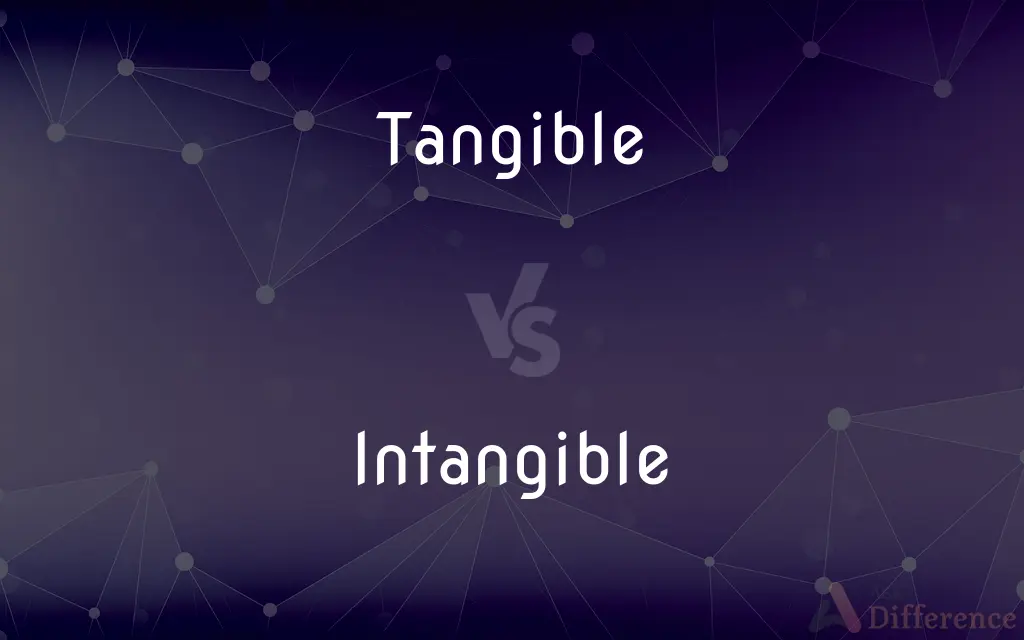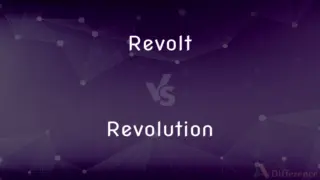Tangible vs. Intangible — What's the Difference?
By Tayyaba Rehman — Updated on September 21, 2023
Tangible items are physical; they can be seen and touched, like a car. Intangible items are non-physical, like knowledge, existing only in connection to something else.

Difference Between Tangible and Intangible
Table of Contents
ADVERTISEMENT
Key Differences
Tangible implies the existence of physical attributes, objects that occupy space and possess mass, visible and touchable. Intangible, contrastingly, signifies non-physical existence, perceived not through the senses but understood intellectually. Tangible items like machinery have a definite presence and measurable value. Intangible items like patents, although valuable, lack a physical presence and their value is conceptual.
Tangible can be quantified and evaluated objectively due to its physical nature, presenting concrete evidence of its existence. Intangible is elusive, subjective, often quantified through indirect measures and proxies. Tangible assets like real estate can be appraised based on physical characteristics and market conditions. Intangible assets like goodwill are valued based on perceptions, expectations, and relative advantages.
Tangible objects are usually durable, retaining their physical properties over time unless acted upon by external forces. Intangible entities are dynamic and can evolve, change, and dissipate without any physical alteration. A tangible book retains its form and content unless damaged or destroyed. An intangible idea can transform, expand, or fade, influenced by thoughts, discussions, and interpretations.
Tangible and intangible both hold significant value, each contributing uniquely to individual and organizational wealth and progress. Tangible assets like buildings and equipment enable operational functionalities. Intangible assets like skills and knowledge fuel innovation and differentiation. Tangibles provide the infrastructure for activities, while intangibles provide the essence and direction for advancements.
Comparison Chart
Nature
Physical and perceptible.
Non-physical and conceptual.
ADVERTISEMENT
Measurement
Can be objectively measured.
Often measured through indirect means.
Durability
Usually durable.
Can evolve, change or dissipate easily.
Valuation
Valued based on physical properties and market conditions.
Valued based on perceptions and relative advantages.
Evidence
Provides concrete evidence of existence.
Lacks concrete evidence, understood intellectually.
Compare with Definitions
Tangible
Tangible implies having a definite form that can be touched.
The tangible benefits of the new policy were immediately evident.
Intangible
Intangible refers to things that lack a physical presence.
Brand reputation is an intangible asset that adds significant value to a company.
Tangible
Tangible refers to objects that have a physical presence.
The tangible evidence was crucial in solving the case.
Intangible
Intangible implies being unable to touch or grasp.
The intangible nature of creativity makes it a fascinating subject of study.
Tangible
Tangible assets have a measurable and objective value.
The company’s tangible assets included buildings and machinery.
Intangible
Intangible represents ideas, concepts, and knowledge.
The intangible wisdom passed down through generations is priceless.
Tangible
Discernible by the touch; palpable
A tangible roughness of the skin.
Intangible
Incapable of being perceived by the senses.
Tangible
Possible to touch.
Intangible
Incapable of being realized or defined.
Tangible
Possible to be treated as fact; real or concrete
Tangible evidence.
Intangible
Incorporeal.
Tangible
Possible to understand or realize
The tangible benefits of the plan.
Intangible
Something intangible
The athlete owed his success not only to strength and speed but also to intangibles such as perseverance and dedication.
Tangible
(Law) Relating to or being property of a physical nature, such as land, objects, and goods.
Intangible
An asset that cannot be perceived by the senses, such as intellectual property or goodwill.
Tangible
Something palpable or concrete.
Intangible
(Law) Incorporeal property such as bank deposits, stocks, bonds, and promissory notes
A state tax on intangibles.
Tangible
Tangibles Property having a physical form.
Intangible
Incapable of being perceived by the senses; incorporeal.
Tangible
; able to be touched or felt; perceptible by the sense of touch.
Intangible
Anything intangible
Tangible
; able to be perceived.
Intangible
(legal) Incorporeal property that is saleable though not material, such as bank deposits, stocks, bonds, and promissory notes
Tangible
Able to be treated as fact; real or concrete.
Intangible
Not tangible; incapable of being touched; not perceptible to the touch; impalpable; imperceptible.
A corporation is an artificial, invisible, intangible being.
Tangible
By the mind; understandable.
Intangible
Assets that are saleable though not material or physical
Tangible
A physical object; something that can be touched.
Intangible
(of especially business assets) not having physical substance or intrinsic productive value;
Intangible assets such as good will
Tangible
Or concrete results.
Yes, but what are the tangibles?
Intangible
Incapable of being perceived by the senses especially the sense of touch;
The intangible constituent of energy
Tangible
Perceptible to the touch; tactile; palpable.
Intangible
Hard to pin down or identify;
An intangible feeling of impending disaster
Tangible
Capable of being possessed or realized; readily apprehensible by the mind; real; substantial; evident.
Direct and tangible benefit to ourselves and others.
Intangible
Lacking substance or reality; incapable of being touched or seen;
That intangible thing--the soul
Tangible
Perceptible by the senses especially the sense of touch;
Skin with a tangible roughness
Intangible
Intangible denotes things that are not concrete or substantial.
The intangible benefits of the initiative were harder to quantify but equally important.
Tangible
Possible to be treated as fact;
Tangible evidence
His brief time as Prime Minister brought few real benefits to the poor
Intangible
Intangible assets are valued based on perceived advantages.
Intellectual property is an intangible asset that can give a competitive edge.
Tangible
(of especially business assets) having physical substance and intrinsic monetary value ;
Tangible property like real estate
Tangible assets such as machinery
Tangible
Capable of being perceived by the senses or the mind; especially capable of being handled or touched or felt;
A barely palpable dust
Felt sudden anger in a palpable wave
The air was warm and close--palpable as cotton
Tangible
Having substance or material existence; perceptible to the senses;
A physical manifestation
Surrounded by tangible objects
Tangible
Tangible denotes something real and substantial.
The project had tangible results, clearly showcasing its success.
Tangible
Tangible means perceptible by touch or any of the senses.
The tension in the room was almost tangible.
Common Curiosities
What does Intangible mean?
Intangible implies things that lack physical presence and are perceived intellectually, like ideas and knowledge.
Can Tangible items change over time?
Tangible items are generally durable but can change due to wear and tear, damage, or external forces.
Can Intangible assets be converted to Tangible assets?
While different in nature, the value of intangible assets can sometimes be realized through tangible outcomes like increased revenue.
What is Tangible?
Tangible refers to things that are physical, visible, and touchable, having a definite form and substance.
Can Tangible items be measured and valued easily?
Yes, tangible items can usually be measured and valued objectively due to their physical properties.
Is it difficult to measure Intangible items?
Yes, intangible items are often elusive and measured through indirect means and subjective assessment.
Are both Tangible and Intangible important for organizations?
Absolutely, both tangible and intangible contribute significantly to an organization’s value and operation.
Is a building a Tangible or Intangible asset?
A building is a tangible asset as it has physical existence and properties.
Are Tangible assets usually considered more secure investments?
Tangible assets are often considered more secure due to their physical existence and measurable value, but this can vary based on market conditions and other factors.
Can the value of Intangible assets be more subjective?
Yes, the value of intangible assets is often more subjective, based on perceptions, advantages, and expected benefits.
Can Intangible entities evolve or dissipate?
Yes, intangible entities can evolve, change, and even dissipate without any physical alteration.
Are Tangible assets usually more valuable than Intangible ones?
Not necessarily, both tangible and intangible assets can hold immense value, and in some cases, intangible assets like brand value can be extremely valuable.
Can Intangible be perceived by senses?
No, intangible cannot be perceived by senses as it lacks a physical presence; it is understood intellectually.
Is knowledge Tangible or Intangible?
Knowledge is considered intangible as it lacks physical existence and is perceived intellectually.
Can Intangible concepts be transformed into Tangible products?
Yes, intangible concepts, ideas, and knowledge can be materialized into tangible products or outcomes.
Share Your Discovery

Previous Comparison
Revolt vs. Revolution
Next Comparison
Chorion vs. PlacentaAuthor Spotlight
Written by
Tayyaba RehmanTayyaba Rehman is a distinguished writer, currently serving as a primary contributor to askdifference.com. As a researcher in semantics and etymology, Tayyaba's passion for the complexity of languages and their distinctions has found a perfect home on the platform. Tayyaba delves into the intricacies of language, distinguishing between commonly confused words and phrases, thereby providing clarity for readers worldwide.
















































